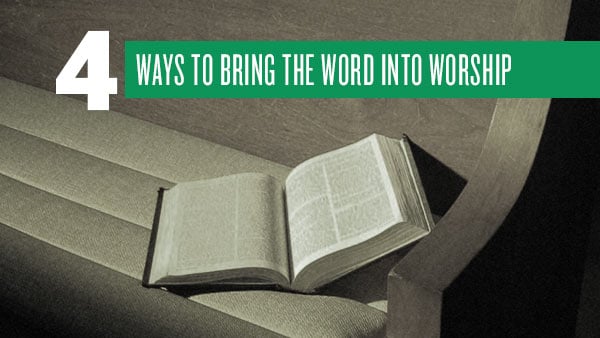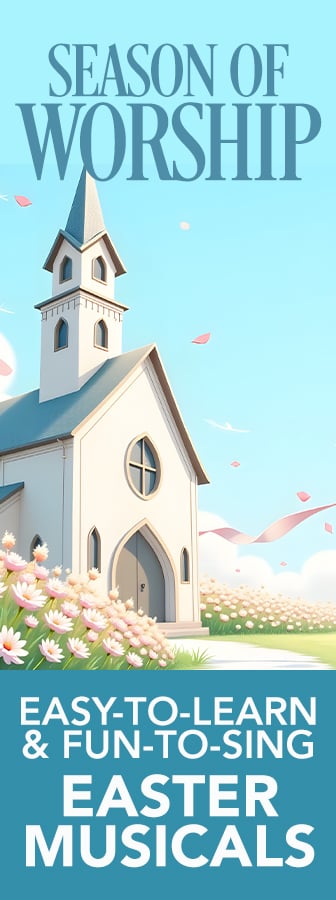
I have a pastor friend who said on one occasion as he stood to preach: “The Word of God is the most important proclamation you'll hear today. Everything else is just commentary.” It's worth thinking about, isn't it?
As “people of the Word,” it's also worth evaluating how much of the scripture is actually included in our corporate worship experiences. If we really took time to analyze it, it just might be less than we think. There are, of course, references and allusions to the Bible in the songs we sing, and maybe in the prayers we pray. But the unfiltered reading and proclamation of the Word of God has power … power to comfort, to assure, to challenge, to convict, and to lead us to repentance.
So, how do we do this creatively, with the most impact? Here are four ideas:
- As an interlude in a congregational song. We recently included the hymn, Grace Greater Than Our Sin, in one of our worship sets. After a couple of verses and choruses, two readers came forward and read significant passages of scripture that were “grace” themed as our pianist played quietly under them. Then we sang the chorus one more time.
- As an introductory set-up to a choir piece. You may have to alter, adapt or expand the introduction to a choir anthem, but when that selection is based on, or strongly refers to, a scripture text, hearing the passage read before the choir sings really helps reinforce the message.
- As a responsive reading. Models for these type readings are easily found in most hymnals, or with a little effort, you can create your own. These can be dialogs between Choir and Congregation, Leader and Congregation, Men and Women, or any combination of these. [Hint: the larger the group that's speaking, the shorter their part should be.]
- Spontaneous participation. Simply ask people to stand and quote (or read) a significant verse or passage of scripture. A prompt from the worship leader as to the theme is the best way to handle this: God's promises, faithfulness, love, etc. are good starting points. You might want to introduce this idea at the beginning of the service and actually incorporate it several minutes later, or just do it “spur of the moment.”
There's an undeniable comfort and assurance that's derived when our folks realize that what we're doing isn't based on our personal preferences or on popular opinion, but on the time-tested, unfailing Word of God. So, however you choose to do it, incorporate scripture regularly, and as creatively as possible in the worship services you help plan and implement. After all, God's Word will never return to Him void. And that's a promise you can count on!
Whatever you do, don't get trapped into thinking that music is the only component of worship. It's not. It's vital, but it's not all there is. There's prayer, there's Communion (or the Lord's Supper or the Eucharist), there's the Offering (a beautiful visual representation of the giving of our lives as well as our treasure), there's the Greeting (another biblical concept), and of course, there's the reading of scripture.
Now, having said all that, let me remind you of just how important it is that scripture be a main ingredient in the music we sing. And not only that, but let me remind you of just how important it is that our choirs and congregations realize how much scripture is involved in the music they sing. When everybody understands this, then there's a confidence and assurance that what we're singing isn't based on human opinions or personal preferences, but on what's eternal, authoritative, divine.
Sometimes we play a little game in our choir. I'll challenge the singers to discover and report where a particular title, phrase or image in a song comes from in the Bible. Sometimes it's obvious, sometimes not so much. All in all, it gets us looking at how one concept from scripture is related to another. And it's really a fun exercise, driving all of us to dig a little deeper.
But what about secular songs in corporate worship? This can be a touchy subject, I know, but it's probably worth considering what it is that, in our mind, makes a song “secular.” The lyrics? The chord progression? The songwriter? The original recording artist? We don't make a regular practice of this, but last week our pastor (also a seminary professor and pretty impressive singer himself) sang, as part of his message, the old '60s hit, He Ain't Heavy (He's My Brother) and it worked beautifully as a creative illustration relating to the story of the Good Samaritan. No direct scripture quotes in it, but it's chock full of scriptural allusion.
The fortunate fall-out in scripture-based music is that it lends to us, as worship leaders, a natural source to base spoken introductions and segues on. It's important that, when you're speaking publicly, you actually have something to say; something encouraging, something motivating, something true.
Let the word of Christ dwell in you richly as you teach and admonish one another with all wisdom, and as you sing psalms, hymns and spiritual songs with gratitude in your hearts to God. (Colossians 3:16 NIV)
--For additional resources on worship service planning, check out more blogs at discoverworship.com.











